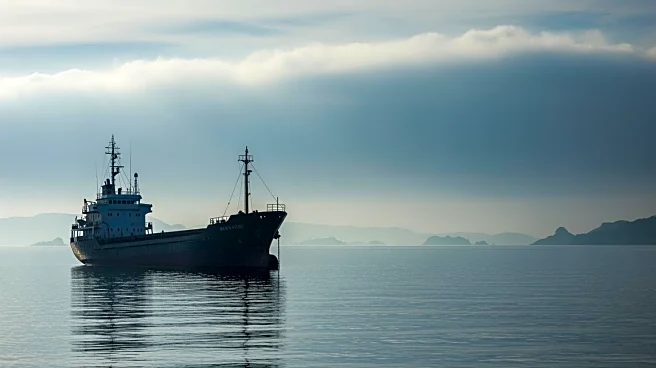What's Happening?
The Iranian Revolutionary Guard's navy seized a tanker named Talara in the Gulf of Oman, as confirmed by Iran's Tasnim news agency. The vessel, which had departed from the United Arab Emirates, was carrying
30,000 tons of petrochemical materials bound for Singapore. The seizure was reportedly conducted to protect Iran's interests and resources, following orders from Iranian judicial authorities. The tanker, flagged to the Marshall Islands, deviated from its course towards Iranian territorial waters after small boats approached it. A U.S. official confirmed the seizure, although Iran acknowledged the incident a day later. The vessel's operator, Cyprus-based Columbia Shipmanagement, lost contact with the tanker, which was transporting high-sulfur gas oil. British maritime security firm Ambrey described the incident as 'highly targeted,' occurring about 40 kilometers off the UAE coast.
Why It's Important?
This incident highlights ongoing maritime tensions in the region, particularly following the Hamas-led attack on Israel in October. The seizure underscores Iran's assertive stance in protecting its maritime interests, potentially affecting international shipping routes and regional security dynamics. The event may exacerbate existing geopolitical tensions, especially given recent attacks on vessels linked to Israel by Houthi rebels in Yemen. The seizure could impact global petrochemical supply chains, as the tanker was carrying significant quantities of petrochemical materials. Stakeholders in the shipping industry and regional governments may need to reassess security protocols and diplomatic strategies to mitigate further disruptions.
What's Next?
Vessels operating in the Gulf of Oman and surrounding areas are advised to navigate with caution and report suspicious activities, as per the United Kingdom Maritime Trade Operations agency. The incident may prompt increased maritime security measures and diplomatic engagements to address the underlying tensions. Regional stakeholders, including the UAE and Iran, might engage in discussions to prevent further escalations. The international community may also monitor the situation closely, considering potential impacts on global trade and regional stability.
Beyond the Headlines
The seizure of the tanker reflects broader geopolitical dynamics in the Middle East, where maritime routes are increasingly becoming arenas for power projection and resource control. The incident may influence future maritime security policies and international relations, particularly concerning Iran's role in regional affairs. Long-term implications could include shifts in shipping routes and increased insurance costs for vessels operating in volatile areas.








